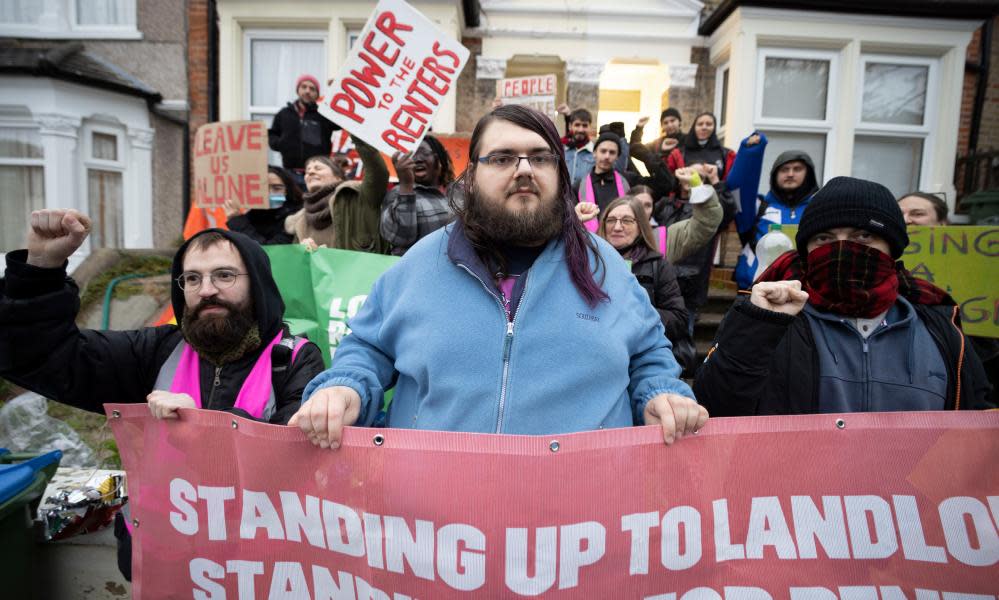Renter activists block London eviction as end of Covid protections takes toll

A standoff with bailiffs ended in victory for renter activists in south-east London on Wednesday when they blocked the latest in a rising number of evictions triggered by the unwinding of national measures to prevent homelessness during the pandemic.
Twenty members of the London Renters Union stood in the way of three county court-authorised bailiffs who arrived to evict George Smith, 28, and his partner Paul MacKinnon, 35, in Abbey Wood. MacKinnon was the household’s main breadwinner but lost his job at the start of the pandemic and the pair sank into £12,000 of arrears.
Smith, who spent Wednesday fearing he could be thrown out of his two-bedroom terrace house at a few minutes’ notice, said: “Even though the pandemic is still ongoing, [the government] refused to renew the protections. I feel very let down. This has probably been the most anxious time of my life so far.”
Related: At least 130,000 households in England made homeless in pandemic
The action came as official figures showed the threat of no-fault evictions has reached pre-pandemic levels despite government promises in 2019 to ban the practice. There were 3,280 households in England put at risk of homelessness because of no-fault eviction notices between April and June, double the number at the start of the pandemic and up from 2,650 in the previous quarter.
A ban on bailiff evictions, introduced by ministers last year to protect tenants struggling during the pandemic, was lifted in England in June, and in October eviction notice periods reverted to two months, having been extended to four.
In July to September, the first full quarter since the ban on bailiff actions lifted, there was a 207% increase in landlord repossessions, to 4,853.
Bailiffs arriving in Abbey Wood just before 10am told union activists that the tenants “will have 10 minutes to take a bag of essential clothing and medicine. If they are not ready they will be taken out of the property.”
But the bailiffs could not get up the front steps, which were blocked by activists holding placards that read “power to the renters” and “housing is a human right”. They went away, meaning they will have to seek a new court order for another day.
Grace Black, 24, an activist in a neon “eviction resistance team” tabard, said: “There are thousands of people whose current cases have been delayed. It means people at risk of having their lives ruined.”
Miriam King, 26, an organiser for the London Renters Union, said: “We think this is something we are going to have to do more. We have seen more people going through evictions having received a section 21 [no-fault eviction notice] or caught up in arrears during the pandemic.”
Housing campaigners believe the true impact of the ban lifting is yet to be seen because many cases are caught in a courts backlog.
Related: Government pledges £65m to help vulnerable renters in arrears in England
Smith said: “We are facing an unprecedented eviction crisis in this country as a result of a lot of people losing their jobs in the pandemic and the rental sector doing everything in their power to kick people out as soon as possible.”
In Wales and Scotland, landlords will have to give six months’ notice until 1 January 2022 and 1 April respectively.
A renters reform bill promised by ministers to tackle no-fault evictions has been delayed until next year.
“For many renters, the eviction ban was the only thing standing between them and homelessness,” said Jon Sparkes, the chief executive of Crisis. “With this protection now gone, once again people are being needlessly forced from their homes into an unpredictable and unaffordable rental market.”
The Department for Levelling Up, Housing and Communities has been approached for comment.

 Yahoo News
Yahoo News 
